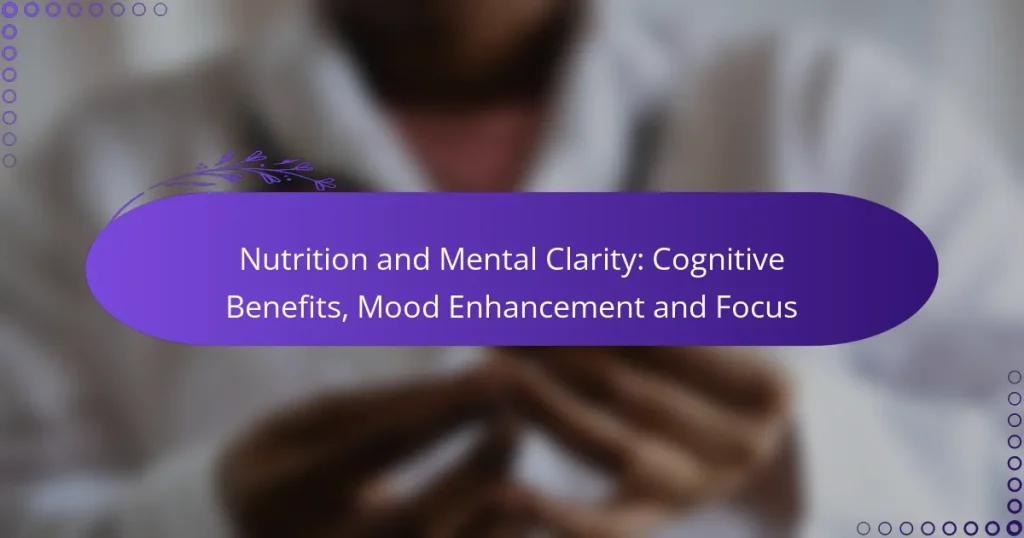Nutrition is vital for enhancing mental clarity, as it supplies the essential nutrients needed for optimal brain function. A well-balanced diet, rich in antioxidants, healthy fats, vitamins, and minerals, can significantly improve focus, elevate mood, and boost overall cognitive performance.

How can nutrition improve mental clarity in the United States?
Nutrition plays a crucial role in enhancing mental clarity by providing essential nutrients that support brain function. A balanced diet rich in specific foods can lead to improved focus, better mood, and overall cognitive performance.
Omega-3 fatty acids
Omega-3 fatty acids are vital for brain health and are linked to improved cognitive function and mood stabilization. Found in fatty fish like salmon, walnuts, and flaxseeds, these healthy fats help reduce inflammation and support neurotransmitter function.
To incorporate omega-3s into your diet, aim for at least two servings of fatty fish per week or consider plant-based sources if you follow a vegetarian diet. Supplements can also be an option, but consult a healthcare provider for appropriate dosages.
Antioxidant-rich foods
Antioxidant-rich foods, such as berries, dark chocolate, and leafy greens, help combat oxidative stress in the brain, which can enhance mental clarity. These foods protect brain cells from damage and support overall cognitive health.
Including a variety of colorful fruits and vegetables in your meals can maximize your antioxidant intake. Aim for at least five servings of fruits and vegetables daily to reap these benefits.
Whole grains
Whole grains like oats, brown rice, and quinoa provide a steady source of energy for the brain, which is essential for maintaining focus and clarity. They are rich in fiber and B vitamins, which support brain function and mood regulation.
Incorporate whole grains into your diet by choosing them over refined grains. For example, opt for whole-grain bread instead of white bread and include whole grains in salads and side dishes.
Hydration
Staying hydrated is crucial for optimal brain function, as even mild dehydration can impair cognitive abilities and mood. Water is essential for nutrient transport and maintaining the brain’s electrical activity.
To ensure adequate hydration, aim for about 2 to 3 liters of water daily, depending on activity level and climate. Keep a water bottle handy and drink regularly throughout the day.
B vitamins
B vitamins, particularly B6, B12, and folate, are essential for brain health and can enhance mental clarity and mood. These vitamins play a role in neurotransmitter production and energy metabolism in the brain.
Include sources of B vitamins in your diet, such as whole grains, eggs, dairy products, and leafy greens. If you’re concerned about your intake, consider discussing supplementation with a healthcare professional.

What foods enhance mood and cognitive function?
Foods that enhance mood and cognitive function include those rich in antioxidants, healthy fats, vitamins, and minerals. Incorporating a variety of these foods into your diet can support mental clarity and emotional well-being.
Dark chocolate
Dark chocolate is known for its ability to boost mood and cognitive performance due to its high levels of flavonoids, which improve blood flow to the brain. Consuming a small amount, around 30 grams a few times a week, can provide benefits without excessive sugar intake.
Look for dark chocolate with at least 70% cocoa content to maximize health benefits. Enjoy it as a treat or add it to smoothies for an extra boost.
Leafy greens
Leafy greens like spinach, kale, and Swiss chard are packed with vitamins A, C, and K, as well as folate, which is crucial for brain health. Regular consumption can help reduce cognitive decline and improve mood stability.
Aim to include a serving of leafy greens in your meals daily. They can be easily added to salads, smoothies, or stir-fries for a nutritious boost.
Fermented foods
Fermented foods such as yogurt, kefir, sauerkraut, and kimchi support gut health, which is closely linked to mental health. The probiotics in these foods can enhance mood and cognitive function by promoting a healthy gut microbiome.
Incorporate a serving of fermented foods into your diet several times a week. This can be as simple as adding yogurt to breakfast or including sauerkraut in sandwiches.
Fatty fish
Fatty fish like salmon, mackerel, and sardines are rich in omega-3 fatty acids, which are essential for brain health and mood regulation. Consuming these fish at least twice a week can significantly improve cognitive function and emotional well-being.
Opt for wild-caught varieties when possible for higher omega-3 content. Grilling or baking fish with herbs and lemon can make for a delicious and healthy meal.

How does diet affect focus and concentration?
Diet significantly influences focus and concentration by providing essential nutrients that support brain function. A well-balanced diet can enhance cognitive performance, improve mood, and increase overall mental clarity.
Balanced macronutrients
Maintaining a balance of macronutrients—proteins, fats, and carbohydrates—is crucial for optimal cognitive function. Each macronutrient plays a role in brain health; for instance, proteins supply amino acids that are precursors to neurotransmitters, while healthy fats support cell membrane integrity.
A practical approach is to include a variety of sources in your meals. Aim for a plate that consists of approximately 30% protein, 30% healthy fats, and 40% carbohydrates to sustain energy levels and cognitive performance throughout the day.
Low glycemic index foods
Low glycemic index (GI) foods release glucose slowly into the bloodstream, providing a steady energy supply that enhances focus and concentration. Foods such as whole grains, legumes, and most fruits and vegetables help maintain stable blood sugar levels, preventing energy crashes.
Incorporating low GI foods into your diet can be straightforward. For example, choose brown rice over white rice or opt for whole grain bread instead of white bread. This can help sustain mental clarity and improve overall cognitive function.
Regular meal timing
Regular meal timing is essential for maintaining consistent energy levels and cognitive performance. Eating at regular intervals helps regulate blood sugar levels, which can directly impact focus and concentration.
To optimize mental clarity, aim for three balanced meals per day, supplemented by healthy snacks if needed. Avoid skipping meals, as this can lead to dips in energy and concentration, making it harder to stay focused on tasks.

What role do supplements play in cognitive health?
Supplements can significantly impact cognitive health by providing essential nutrients that support brain function, enhance mood, and improve focus. They may help fill dietary gaps and promote mental clarity, especially in individuals with specific deficiencies or high cognitive demands.
Fish oil supplements
Fish oil supplements are rich in omega-3 fatty acids, which are crucial for brain health. These fatty acids, particularly EPA and DHA, have been linked to improved cognitive function and reduced symptoms of depression and anxiety.
When considering fish oil, aim for a daily intake of about 1,000 to 2,000 mg of combined EPA and DHA. Look for products that are certified for purity and free from heavy metals to ensure safety.
Ginkgo biloba
Ginkgo biloba is an herbal supplement known for its potential to enhance memory and cognitive speed by improving blood circulation to the brain. Some studies suggest it may help with age-related cognitive decline.
For effective results, a typical dosage ranges from 120 to 240 mg per day, taken in divided doses. Be cautious if you are on blood-thinning medications, as Ginkgo can increase bleeding risk.
Rhodiola rosea
Rhodiola rosea is an adaptogen that may help the body manage stress and fatigue, potentially enhancing mental clarity and focus. It is thought to improve energy levels and cognitive performance, especially during stressful periods.
A common dosage is between 200 to 600 mg per day. It’s advisable to start with a lower dose to assess tolerance and avoid potential side effects like insomnia or irritability.

How can I choose the right nutrition plan for mental clarity?
To choose the right nutrition plan for mental clarity, focus on a balanced diet rich in whole foods, healthy fats, and essential nutrients. Prioritize foods known to enhance cognitive function, such as fatty fish, nuts, berries, and leafy greens.
Consulting a nutritionist
Consulting a nutritionist can provide personalized guidance tailored to your specific cognitive needs and lifestyle. A professional can help identify any deficiencies in your current diet and suggest foods that promote mental clarity and mood enhancement.
During consultations, be prepared to discuss your dietary habits, health goals, and any existing medical conditions. A nutritionist may recommend a variety of foods or supplements that can support brain health, such as omega-3 fatty acids and antioxidants.
Consider asking about meal planning strategies that fit your schedule and preferences. A well-structured plan can help you incorporate brain-boosting foods consistently, which is essential for maintaining mental clarity over time.


